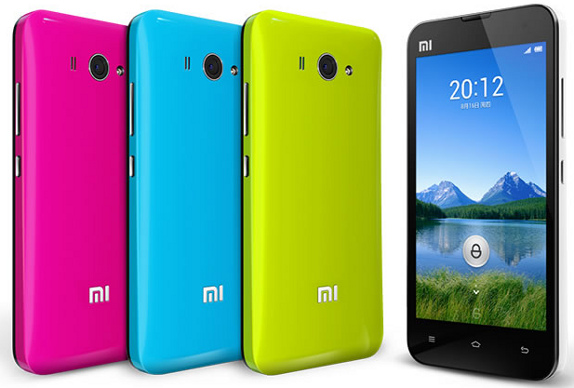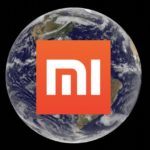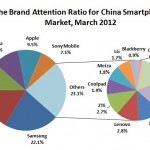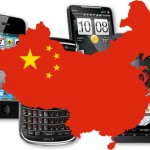Market report: Xiaomi In China
Market report: Xiaomi In China
More reports about smartphone market in China : here.
MI-ONE, sometimes also referred as MI-ONE Plus or Xiaomi Phone, is a smart mobile phone designed by the Xiaomi Tech Company, which was created by Lei Jun, CEO of Kingsoft. Xiaomi is a high-end smartphone with a Qualcomm Snapdragon S3 (dual core, 1.5 GHz) CPU and an Adreno 220 GPU,but its price (RMB1999/around USD310) is less than half the cost of a typical dual-core CPU smartphone. When it was released, the phone received more than 300,000 pre-orders in the first 34 hours. Since its initial two round 100,000 unit open to public releases on 18th December 2011 and 4th January 2012, the company has sold a total of 500,000 units. Xiaomi is shipped with MIUI pre-loaded, but also supports stock Android ROMs and other 3rd party ROMs, and is in consideration to add Microsoft’s Windows Phone 7 to the phone.
High-performance, low price strategy
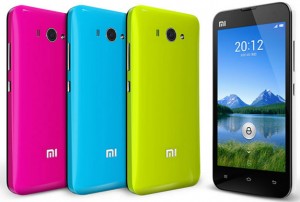 The driving force behind Xiaomi’s success is its “high-performance, low price” strategy. China has experienced an unprecedented development in the mobile phone market in recent years. Both international brands and domestic brands compete for the market share, making the mobile market in China fierce. Many mobile phone manufacturers have adopted the new “touch-tech” reform led by Apple. The result of this trend is shifting the mobile market into one that covets high priced high-end touch screen phones. Such phones, such as iPhone or Galaxy series, are usually more than 3,000 RMB (500 USD). The launch of Xiaomi filled the gap. “As a mobile phone enthusiast, what our team did is to manufacture really high-end smartphones with attainable prices for most Chinese.” Said Lei Jun, CEO of Xiaomi Tech Company. There are three main factors to Xiaomi’s success. The first is the company’s specific and clear market positioning. Xiaomi views itself as a high-end, open-platform smart phone, catering to the younger crowd, white-collar wokers and those who are keen on upgrading their phones. The second is its excellent R&D and management team. The development process was led by the masters of former Google, Microsoft, Kingsoft employees that brought rich industrial resources and experience with them. The third factor is its fast and effective sales model. Xiaomi adopt solely online sales, following the trend of e-commerce, also taking advantage of its low-cost and fast service.
The driving force behind Xiaomi’s success is its “high-performance, low price” strategy. China has experienced an unprecedented development in the mobile phone market in recent years. Both international brands and domestic brands compete for the market share, making the mobile market in China fierce. Many mobile phone manufacturers have adopted the new “touch-tech” reform led by Apple. The result of this trend is shifting the mobile market into one that covets high priced high-end touch screen phones. Such phones, such as iPhone or Galaxy series, are usually more than 3,000 RMB (500 USD). The launch of Xiaomi filled the gap. “As a mobile phone enthusiast, what our team did is to manufacture really high-end smartphones with attainable prices for most Chinese.” Said Lei Jun, CEO of Xiaomi Tech Company. There are three main factors to Xiaomi’s success. The first is the company’s specific and clear market positioning. Xiaomi views itself as a high-end, open-platform smart phone, catering to the younger crowd, white-collar wokers and those who are keen on upgrading their phones. The second is its excellent R&D and management team. The development process was led by the masters of former Google, Microsoft, Kingsoft employees that brought rich industrial resources and experience with them. The third factor is its fast and effective sales model. Xiaomi adopt solely online sales, following the trend of e-commerce, also taking advantage of its low-cost and fast service.
Competitors:
iPhone
In the end of 2011, when the iPhone 4S was not yet available in China, there were more and more Chinese smartphone users choosing Xiaomi Phone as an upgrade from their Nokia Symbian-powered phones. Why? Two main reasons: Xiaomi phones are cheap, one could purchase two Xiaomi phones with the money to purchase an iPhone 4 or 4S. Secondly, Xiaomi successfully created an illusion of feverish demand for its smartphones. Just like Apple, Xiaomi does not have its own manufacturing facility and has struggled to produce enough handsets to meet the extremely high demand. But still, Apple remains the pioneer of the smartphone industry and its unique brand image cannot be replicated by Xiaomi or any other competitor.
Samsung Galaxy
In some countries, the Samsung Galaxy series is the first mobile phone manufactured by Samsung that uses the open source Android operating system. The i7500, one of typical Samsung Galaxy phones, is a 3.5G smartphone, offering quad-band GSM and announced with tri-band HSDPA (900/1700/2100) at 7.2Mbit/s. The phone features a 3.2-inch AMOLED capacitive touchscreen, a 5 megapixel auto-focus camera with power LED flash, and a digital compass. One advantage of the Samsung Galaxy over Xiaomu is the variety of product options that the company offers to cater to individual customer needs.
HTC
HTC Corporation, formerly High Tech Computer Corporation, is a Taiwanese manufacturer of smartphones and tablets. The company initially made smartphones predominately based on Microsoft’s Windows Mobile operating system (OS) software, but in 2009 it began to shift its core focus away from Windows Mobile devices to devices based on Android OS, and in 2010 to Windows Phone OS as well.
Huawei
One domestic competitor of Xiaomi is Huawei. Like Xiaomi, Huawei also launched its own smartphone and developed its own operation system. There are several possible advantages of Huawei over Xiaomi. First, Huawei has more financial support, making it more easy to develop better devices and software. Second, Huawei smartphone may become cheaper than Xiaomi because unlike Xiaomi, Huawei manufactures its smartphones itself. Third, Huawei started its business with communication devices, so it has already established good relationships with the operators of the communication market.
Daxue Consulting China Market Study
Sources:
Picture: Xiaomi


